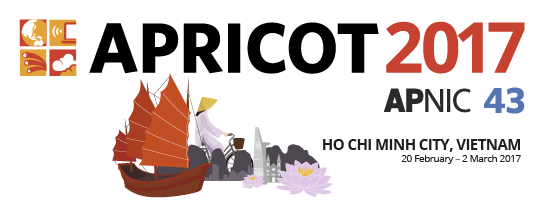
The APRICOT 2017 Programme Committee is now seeking contributions for presentations and tutorials for the APRICOT 2017 conference.
We’re looking for presenters who can:
- Offer a technical tutorial on an appropriate topic;
- Participate in the technical conference sessions as a speaker;
- Convene and chair panel sessions of relevant topics.
Please make your submission online.
Draft slides for both tutorials and conference sessions MUST be provided with submissions otherwise the Programme Committee will be unable to review the submission. For avoidance of doubt, this means that submissions which do not include slides will be rejected immediately. For work in progress, the most current information available at time of submission is acceptable.
All draft and complete slides must be submitted in PDF format only.
Final slides are to be provided by the specified deadline for publication on the APRICOT website.
Prospective presenters should note that the majority of speaking slots will be filled well before the final submission deadline. The PC may, at their discretion, retain a limited number of slots up to the final submission deadline for presentations that are exceptionally timely, important, or of critical operational importance.
Every year we turn away submissions, due to filling up all available programme slots before the deadline. Presenters should endeavour to get material into the PC sooner rather than later.
Important Dates
Call for Papers Opens: Now
Draft Program Published: As Papers Confirmed
Final Deadline for Submissions: 30 January 2017
Final Program Published: 6 February 2017
Final Slides Received: 13 February 2017
NOTE THAT REGARDLESS OF DEADLINES, SLOTS ARE FILLED ON A FIRST COME, FIRST SERVED BASIS
Programme Material
The APRICOT conference programme consists of three parts, these being the Peering Forum, tutorials, and conference tracks.
Topics proposed must be relevant to Internet operations and technologies:
- IPv4 / IPv6 routing and operations
- IPv6 deployment and transition technologies
- Internet backbone operations
- ISP and carrier services
- IXPs and peering
- Research on Internet operations and deployment
- Software Defined Networking / Network Function Virtualisation
- Network security issues (NSP-SEC, DDoS, Anti-Spam, Anti-Malware)
- DNS / DNSSEC
- Internet policy (security, regulation, content management, addressing, etc)
- Access and transport technologies, including cable/DSL, 3G/LTE, wireless, metro ethernet, fibre, MPLS
- Content and service delivery (multicast, voice, video, “telepresence”, gaming) and cloud computing
Any questions or concerns should be addressed to the Programme Committee.
We look forward to receiving your presentation proposals.
The views expressed by the authors of this blog are their own and do not necessarily reflect the views of APNIC. Please note a Code of Conduct applies to this blog.
